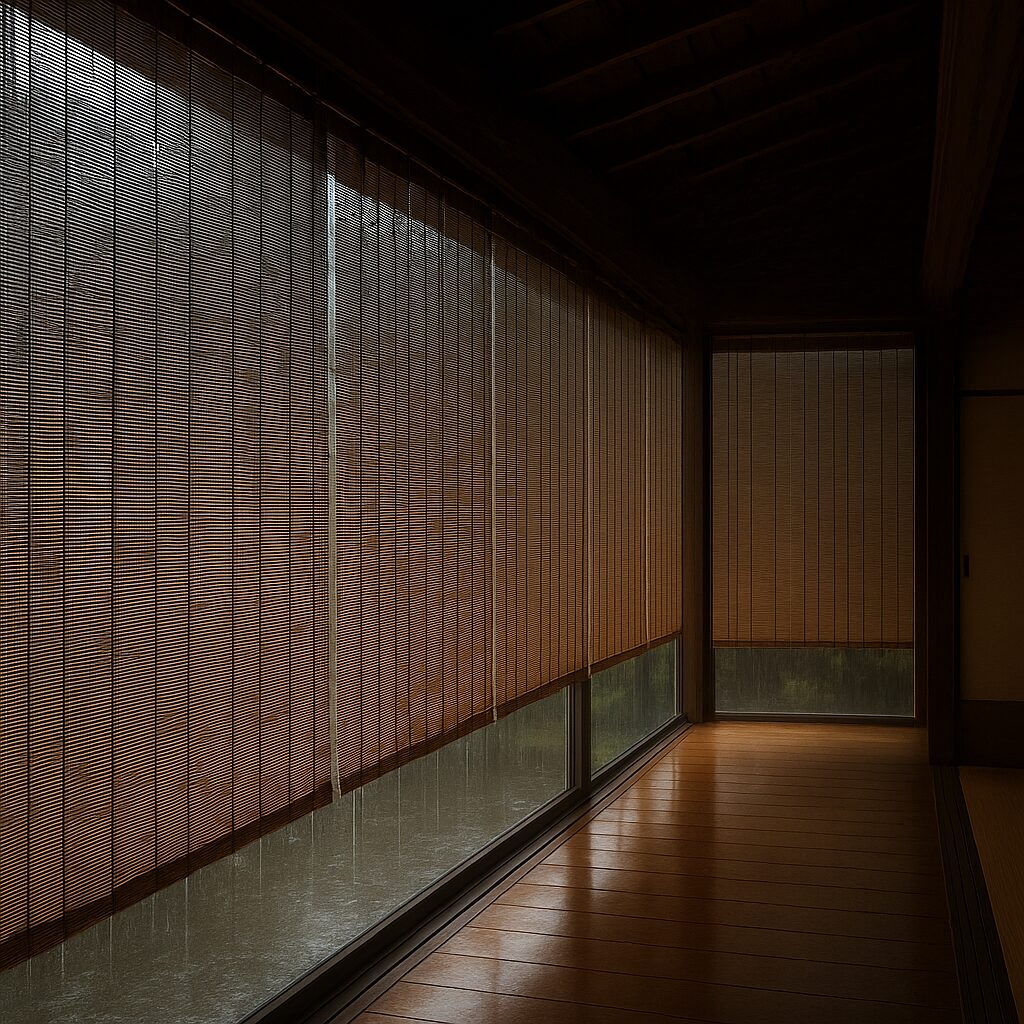I sat on the engawa,
looking out through a row of reed sudare hanging from the eaves.
They still held the weight of rain,
swaying just enough for the light to break and gather again.
Kokoro was there—
in the stillness between movements,
in the softened light at the edge of the engawa.
In Japan, sudare (簾) are traditional blinds made from reed or bamboo,
suspended from the eaves to soften sunlight and let wind pass.
In summer, they create shade while preserving a gentle view of the garden.
On rainy days, they may be left lowered to keep water from the engawa;
on windy days, they are rolled up to prevent damage.
The Weight That Remains
Even after the clouds had drifted away,
the scent of rain, earth, and distant pine lingered.
The row of sudare, heavy along their lower edges,
rested close to the air outside
as if keeping what had touched them.
Drops traveled down each reed in turn,
pausing for a breath at the lowest edge
before touching the stone—
a small leap that dissolved into stillness.
From where I sat,
the filtered light fell in narrow bands across the wooden floor of the engawa,
softening before it reached my feet.
It was not the light itself I noticed—
but the way it slowed,
as if the memory of water still shaped its path.
Where Wind Pauses
The first breeze was hesitant.
It touched the edge of the nearest sudare,
then withdrew,
as if reluctant to disturb the quiet inside.
When it returned,
it brought the scent of wet stone,
the faint rustle of leaves beyond the eaves,
and the cool dampness of air that had traveled over the garden.
The sudare swayed just enough
for light to thread between the reeds,
laying a pattern on the engawa floor—
a pattern that shifted with every breath of wind,
never the same twice.
Listening Without Sound
There was no clear sound to follow—
only the suggestion of movement,
the way shadows deepened
and softened again.
My breathing slowed to match it.
The skin on my forearms
could feel the faint shift in the air,
cool where the light did not reach.
In that rhythm,
something stayed.
Not behind the sudare,
but within the space they shaped.
It was a kind of presence
that asked for nothing—
only to be noticed.
The Light That Waited to Cross
By late afternoon,
the sudare had dried,
but the light still moved with care,
as if shaped by the memory of water.
It lingered for a moment,
then seemed to slip past,
carrying a quiet older than the rain into the space beyond.
In that softened sway,
barely visible,
the presence of Kokoro remained—
not as something to be found,
but as a stillness to be met.
Some things do not fade with the sun.
They keep the trace of what touched them,
and return it in another form.
The sudare no longer held the rain,
but they kept something else—
the memory of how light slows
when shaped by water.
Here, Kokoro stays.
Not in the rain,
not in the light,
but in the quiet space the two shaped together—
a space you can only enter by pausing.
Featured image: The image was created by AI (ChatGPT)



Comments